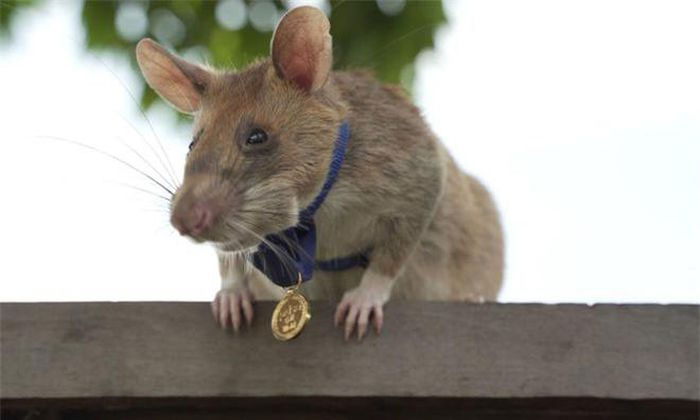The history of Cambodia has been marked by numerous periods of war and conflict. Although the country has now established peace, the presence of landmines (which still remain buried in the soil) continues to threaten the lives of its people.
According to the Cambodian government, there are still approximately 3 to 5 million landmines hidden throughout the country, and it will take at least 150 years to clear them all. The work of landmine clearance is extremely dangerous; even the smallest mistake can result in lifelong injuries or even fatalities for the personnel involved.
Fortunately, the Cambodian army is now supported by a team of specially trained and agile volunteers, the Gambian pouched rats, also known as African giant pouched rats (scientific name: Cricetomys gambianus).

Gambian pouched rats performing landmine clearance duties. (Photo: Sohu).
American scientists conducted a study comparing the olfactory sensitivity of Gambian pouched rats, dogs, and cats; the results showed that their sense of smell is not significantly different. These rats are particularly suited for this task due to their weight of only about 200 grams, which is not heavy enough to trigger a landmine, thus keeping them safe.
When moving through a landmine area, trained Gambian pouched rats know to stop at locations where they detect explosives and alert their handlers. This allows the personnel behind them to approach and safely deal with the bomb, significantly speeding up the clearance process.
A single rat can detect landmines in an area the size of a tennis court within 30 minutes, while a human using a metal detector would take up to 4 days to accomplish the same task in the same area.

A landmine detection rat named Magawa, an outstanding member of the clearance team in Cambodia. (Photo: AP).
In September 2020, a landmine detection rat named Magawa in Cambodia was awarded a gold medal by the British animal charity PDSA for “bravery in saving lives and dedication to the work” of landmine detection. Over the course of 7 years, Magawa detected 39 landmines and 28 unexploded ordnance, clearing more than 141,000 square meters of land in Cambodia.
The method of landmine detection using Gambian pouched rats can now be implemented in many countries, with the potential to replace traditional manual landmine detection methods. However, there are still many considerations to take into account, as Gambian pouched rats are an exotic species that may pose risks to the local ecosystem.




















































